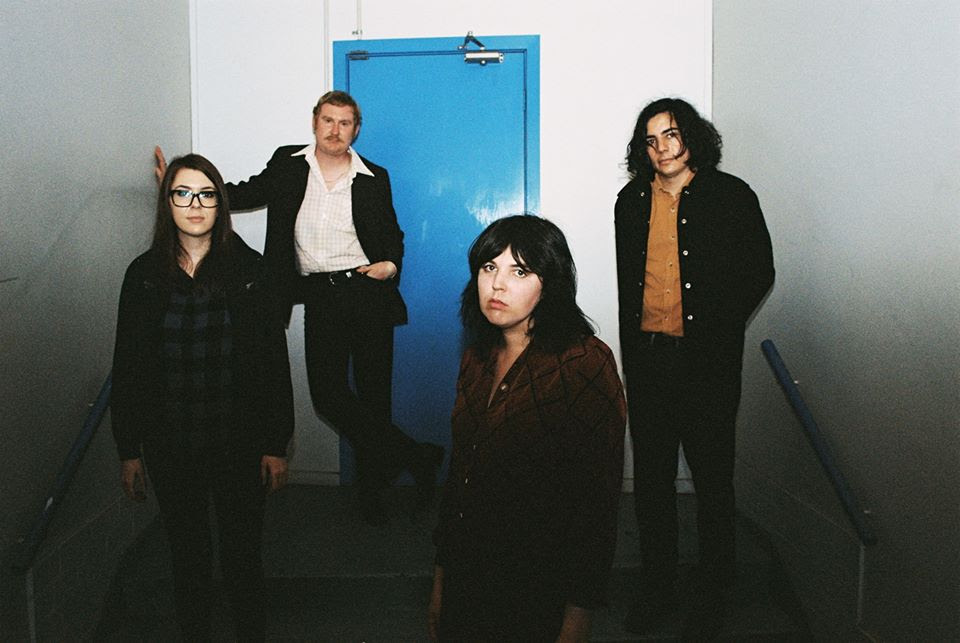“RVG are the best band in Melbourne.” I saw this lofty claim in a tweet from a Melbourne-based musician and radio DJ sometime in 2016. It might seem like a trivial bit of enthusiasm, but Melbourne music acolytes don’t make these sorts of assertions without serious consideration.
So who were RVG? The band – whose name stands for Romy Vager Group – had just self-released their debut album, A Quality of Mercy. Tracked live at Collingwood venue The Tote, it was a work of upright indie rock in the style of The Go-Betweens and Paul Kelly & the Messengers. But RVG went beyond the realm of pure replication thanks to Vager’s curious lyrics and ambivalent vocal timbre, which made it difficult to tell whether she was furiously indignant or blasé in the face of contemporary disappointment.
Access to the album was soon revoked, however, as RVG’s new management recognised the album was deserving of a proper release roll-out. A Quality of Mercy re-emerged in late 2017 courtesy of indie label Our Golden Friend and RVG’s touring activity ramped up accordingly. Following a prized slot at the 2017 Meredith Music Festival, the band hit the US for South By South West 2018 and joined London post-punks Shame on a European tour.
The first taste of RVG’s second album came in early 2019. Commencing with the line, “Come Monday morning, you may find me dead,” ‘Alexandra’ indicated RVG mightn’t just be the best band in Melbourne, but one of the best new guitar bands on the planet. Their live obligations remained steady (and exhaustive) throughout 2019, taking in overseas tours with Rolling Blackouts Coastal Fever and Sleaford Mods and supporting Kurt Vile around Australia.
The past three years of hard onstage fitness are represented on their second album, Feral, which has arrived at last. Once again, however, the album gains distinction from Vager’s vocals. The lyrics include images of severed heads in motel closets, sneering references to Christian neurosurgeons, and various moments of stark introspection, but Vager’s delivery often conveys a sense of defiance or a gleeful embrace of the absurd.
Music Feeds spoke to Vager about the songwriting process, Ludwig Wittgenstein, contemporary complacency and trying to be a better person.
Music Feeds: It must feel like a long time ago that you made A Quality of Mercy. Did you feel like a much stronger creative unit when making Feral?
Romy Vager: When we did the first record, no one apart from me at that time was fully committed. We were all taking our time, occasionally recording a couple of bits and pieces. But then of course that album was really good to us and we started going overseas, so everything got taken a little bit more seriously. So this time around it was a lot more focused and considered than the first one.
MF: Did you have a clearer vision of what you wanted the band to be, stylistically, on Feral?
RV: Not really. At first we just played around with having a band that sounded influenced by all the things we liked. When we got to the second album, I was trying to focus on not having that be such a big element as it was on the first one. I was trying to do things less stylised than they were on the first record. Trying.
MF: So you mean instead of actively referencing the bands you like, you were just writing and seeing what came out?
RV: Yeah, trying to be a bit more clever with stuff, trying to challenge myself with the lyric writing process and just say things a bit differently than I’ve said them before.
MF: The lyrics are always a standout feature of your work. There’s a lot of vivid imagery and curious tangents all over Feral. Do you put more time into the lyrics than anything else?
RV: Yeah. To be honest I don’t really have much of a musical ear. The rest of the band has more of a musical ear than I do. I’m much more focused on trying to come up with lyrics as clearly as possible and putting chords to them. It’s all just a harness for the lyrics, but when it gets to the band then it becomes a bit more musical.
I hate music that doesn’t have good lyrics. It took me a long time to listen to instrumental music when I was younger because I was like “where’s the fucking lyrics?” So it’s my main focus.
MF: You use a few different methods, which give rise to a different response in the listener. For example, songs like ‘Christian Neurosurgeon’ and ‘I Used to Love You’ centre on a few repeating lines, which contrasts with the more elaborate songs like ‘Alexandra’.
RV: They’re more the pop songs on the record. I either try and write things quite complex – like ‘Alexandra’ is complex or ‘Asteroid’ or ‘Photograph’ are complex – but at the same time I just like to repeat something over and over again. They’re my two modes.
MF: ‘Photograph’ reminds me of the sprawling epics that Bob Dylan likes to end his albums with. Did you know ‘Photograph’ would sit at the end of the record when you were working on it?
RV: For sure. We almost named the album ‘Photograph’ because we knew that it’d be a centrepiece of the record. I feel that’s one of the best songs I’ve written. Someone did say to us, “maybe you should put it second to last,” and we were like, “what the fuck are you talking about? We’re not going to do that.” It would just be weird. That’s because I do like those Dylanesque album structures.
MF: ‘Asteroid’ is another really interesting one. The album bio explains that it was inspired by philosopher Ludwig Wittgenstein having his intellectual project overturned late in his life. How did that observation lead to you writing ‘Asteroid’?
RV: One of my favourite movies is Derek Jarman’s movie about Wittgenstein [Wittgenstein (1993)]. It’s this very weird, queer-coded biopic about Wittgenstein and it’s this amazingly beautiful movie. So I’ve always had an interest in this story.
Wittgenstein was this philosopher who wrote these books, loved by everybody and then he was on a train with his friend and – because his philosophical works were based on language – his friend was like “how do you explain this?” And he put his two fingers [into a V-shaped expression] and it just changed his life. He was just like “fuck I’m wrong,” and he never wrote any more books again.
I’m really interested in make or break moments. I’m interested in one action making someone’s worldview crumble and I just thought it would make a really interesting song.
MF: The song basically suggests that an existentially shattering event could occur at any time.
RV: That’s what I like about. I like those existentially shattering moments. I think they’re exciting. You only get one maybe every three or four years if you’re lucky.
MF: Even then it’s hard to fully accept it when it happens. Coronavirus lockdown means we should be experiencing this sort of thing as a society right now.
RV: We are. That’s the amazing thing. What happened four weeks ago we can’t remember. It was a different world. We’re in this new world now and we’re still processing it and it’s terrifying. It’s interesting to look at and see what’s happening right now. Not for many years have we had such a shared experience. I’m really blown away by it.
MF: The bio describes the record as an indictment of contemporary complacency, which is more than justified. Do you succumb to convenience and complacency as much as the next person?
RV: I’m complacent, but I’m always trying to fight it to the point where I get irritated with my life. We very easily just do things and I feel it’s really important to acknowledge why we do them and see where the bad elements of things are and try and work towards making them better. It’s very easy for me to do nothing, but I’m trying to be a better person. I just don’t have any time for nihilism.
MF: That’s an important breakthrough. Self-centred nihilism is almost precisely what the free market wants from us. In what ways are you trying to be a better person?
RV: I’m trying to help, to get out there and do good deeds. I’m trying not to fall for the trap of being self-centred, being complacent. I’m trapped in my house at the moment, so I feel like I’m doing nothing. But I don’t want to be part of the problem, mostly.
You look at what’s going on in the world, you look at the kind of people who run the world, you look at their supporters – there’s this big move towards conservatism, there’s this big move towards dismissing climate change as bullshit. I’m trying to fight that and I think that’s important.
–












